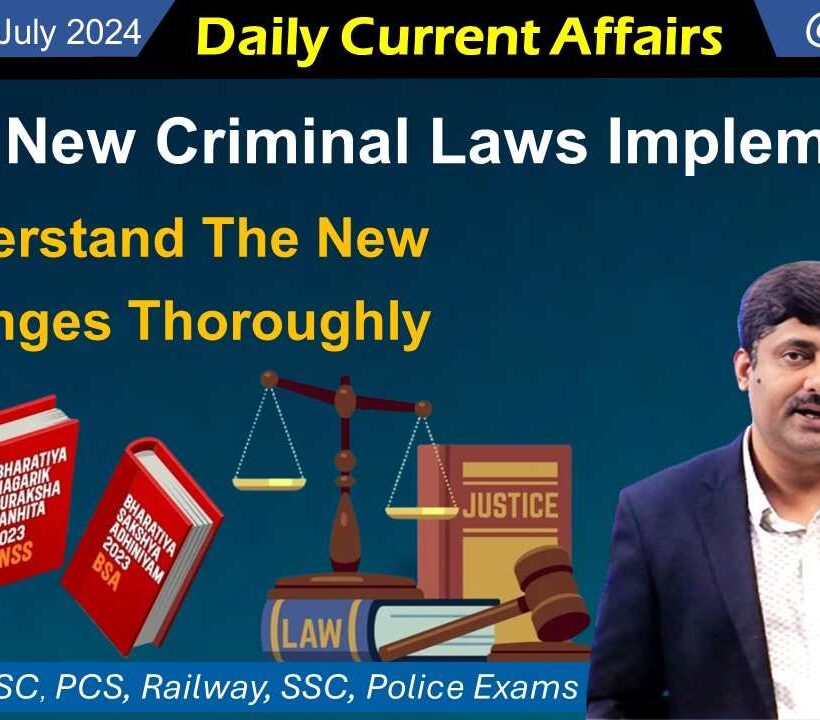This is the current affairs of 30 June & 1 July 2024. Here are questions and answers of daily current affairs for better preparation of competitive exams for government jobs.
PDF Download: Click here
Which ‘Sanhita’ has been implemented by the Central Government in place of the Indian Penal Code (IPC) in the country from July 1, 2024?
a. Bharatiya Nyaya Sanhita (BNS)
b. Bharatiya Nagrik Suraksha Sanhita (BNSS)
c. Bharatiya Sakshya Sanhita (BSS)
d. Bharatiya Dand Vidhan Sanhita (BDVS)
Answer: a. Bharatiya Nyaya Sanhita (BNS)
– The BNS replaced the 162-year-old IPC.
– Note: The draft of the IPC was prepared based on the recommendations of the first Law Commission of India, established in 1834 under the Charter Act of 1833, chaired by Thomas Babington Macaulay. It was implemented in India in 1862 during British rule.
—–
– Trials for all cases registered until June 30, 2024, will be conducted according to the old law.
– From July 1, 2024, new cases will be registered under BNS.
—-
Bharatiya Nyaya Sanhita (BNS)
– BNS has repealed 22 provisions of the IPC and amended 175.
– It has added 8 new sections.
– BNS has a total of 356 sections.
Key differences between IPC and BNS?
– Murder, 302, 101
– Fraud, 420, 318
– Rape, 375, 63
– Gangrape, 376 (D), 70
– Unlawful assembly, 141-144, 187-189
– Riot, 146, 191
– Dowry death, 307, 109
– Attempt to murder, 307, 109
– Defamation, 499, 356
– Kidnapping, 359, 137
– Assault, 351, 130
– Stalking, 354 (D), 78
What’s new in the Bharatiya Nyaya Sanhita (BNS)?
– Sexual exploitation under the pretense of marriage is now a crime.
A separate section for mob lynching.
– A separate section for organized crime, which includes robbery, theft, encroachment, smuggling, and cybercrime.
– Terrorism has been included in criminal laws.
– Attempting suicide to obstruct a public servant from official duty is now a crime.
What has been removed from the Bharatiya Nyaya Sanhita (BNS)?
– Forced unnatural relations are no longer illegal.
– Adultery has been decriminalized and is no longer a crime.
– Gender inequality in most child-related crimes has been removed, giving equal rights to both boys and girls.
New updates in the Bharatiya Nyaya Sanhita (BNS)
– According to Section 69, making false promises of marriage or luring a woman with job or promotion opportunities for sexual relations (even if it doesn’t constitute rape) can result in up to ten years in prison and a fine.
– The police can arrest the accused without a warrant.
– There was no explicit law in the IPC to deal with this. Courts used IPC Sections 493 and 90 under misconception of fact to deliver judgments, which could lead to up to ten years in prison.
Death penalty for gang rape of a minor
– Under Section 70(2) of BNS, every person involved in the gang rape or attempted gang rape of a minor can be sentenced to death.
– Under Section 70(1), gang rape of an adult woman can lead to life imprisonment and a minimum of 20 years in prison.
Extramarital affair is no longer a crime
– Adultery has been removed from BNS. This means that extramarital affairs are no longer considered a crime.
– In 2018, the Supreme Court declared IPC Section 497 unconstitutional, which outlined the rules for adultery.
– However, under Section 84 of BNS, taking a married woman with the intent of having illegal relations by threatening or deceiving her is now considered a crime. This can result in a sentence of 2 years and a fine.
Forced sexual relations with a minor wife will be considered rape
– Section 63 of BNS defines rape.
– Exception 2 states that if a person has forced sexual relations with his wife, it will not be considered rape, provided the wife’s age is over 18 years.
– This means that forced relations with a minor wife will be considered rape. Previously, under IPC Section 375, this age was 15 years.
——–
Community Punishment:
– For the first time, minor offenses (such as causing a disturbance while intoxicated or theft of less than 5,000 rupees) can result in 24-hour detention, a fine of 1,000 rupees, or community service. This type of law is also present in the US and UK.
– Currently, such offenses result in imprisonment.
Proposed Sedition Law:
– Home Minister Amit Shah, while presenting the bill, stated that the sedition law has been abolished. However, the truth is that it has been included under a new name.
– Section 150 of the Bharatiya Nyaya Sanhita (BNS) Bill, 2023, pertains to offenses related to sedition.
– Although the term “sedition” is not used, the offense is described as an act “endangering the sovereignty, unity, and integrity of India.”
– Under Section 150, any act against the nation, whether spoken, written, or conveyed through signs, pictures, or electronic means, can lead to a punishment ranging from 7 years to life imprisonment. Endangering the unity and sovereignty of the country will be considered a crime. The term “terrorism” has also been defined.
– Under the old IPC Section 124A, sedition carried a punishment of 3 years to life imprisonment. However, the Supreme Court has already nullified this section.
Punishment for Absconders:
– Provisions for punishing criminals who are absent during hearings have been included.
– After completing the entire process, if a Sessions Court judge declares someone an absconder, the trial will continue in their absence, and they will be sentenced.
– No matter where they hide in the world, they will be sentenced. If they wish to avoid punishment, they must submit to the justice system.
Conditions on Sentence Commutation:
– Only life imprisonment can be commuted to 7 years imprisonment.
– This ensures that politically influential individuals cannot escape the law.
– The government cannot withdraw cases with sentences of 7 years or more without hearing the victim’s side.
————–
Which ‘Sanhita’ has been implemented in the country in place of the Code of Criminal Procedure (CrPC) from July 1, 2024?
a. Bharatiya Nyaya Sanhita (BNS)
b. Bharatiya Nagrik Suraksha Sanhita (BNSS)
c. Bharatiya Sakshya Sanhita (BSS)
d. Bharatiya Dand Vidhan Sanhita (BDVS)
Answer: b. Bharatiya Nagrik Suraksha Sanhita (BNSS)
– 9 provisions of the CrPC have been repealed through BNSS.
– 160 provisions have been amended.
– 9 new provisions have been introduced.
– BNSS now contains a total of 533 sections.
New Updates:
– FIR can be lodged without going to the police station (Previously, E-FIR could be registered for crimes like theft in some states, but now E-FIR can be registered across the country even for serious cases like murder, robbery, and rape).
– FIR can be registered at any police station: Section 173 provides for zero FIR. No matter the location of the incident, FIR can be lodged.
– Case information via phone: Updates will be provided through SMS.
– Provision for information about arrest: According to Section 46, a person has the right to inform any one person of their choice about the arrest. Videography will also be done.
– Forensic investigation mandatory in serious cases: Section 176 makes forensic investigation mandatory in serious crime cases. For all cases with sentences of more than seven years, forensic experts will go to the crime scene to collect evidence. Police will also need to videograph while searching someone’s house.
– Investigation of crimes against women and children to be completed within 2 months.
Trial Court Decision to be Delivered in 3 Years:
– The biggest change is that now the trial court must deliver every decision within a maximum of 3 years.
– There are 50 million pending cases in the country.
– Out of these, 44.4 million cases are in trial courts.
Use of Handcuffs:
– A police officer may be permitted to use handcuffs when arresting a person if he is a habitual, repeat offender who has escaped custody, or has committed organized crime, terrorist acts, drug-related offenses, illegal possession of weapons, murder, rape, acid attack, counterfeit currency, human trafficking, sexual offenses against children, or crimes against the state.
Approval for Prosecution:
– The decision to approve or reject prosecution of a public servant must be made by the government within 120 days of receiving the request.
– If the government fails to do so, approval will be deemed granted.
– No approval is needed in cases of sexual offenses, trafficking, etc.
————–
Which ‘Sanhita’ has been implemented by the Central Government in place of the Indian Evidence Act across the country from July 1, 2024?
a. Bharatiya Nyaya Sanhita (BNS)
b.Bharatiya Nagrik Suraksha Sanhita (BNSS)
c. Bharatiya Sakshya Sanhita (BSS)
d. Bharatiya Dand Vidhan Sanhita (BDVS)
Answer: c. Bharatiya Sakshya Sanhita (BSS)
– BSS has repealed 5 provisions of the old Indian Evidence Act.
– Along with changes in 23 provisions, new provisions have also been included.
– Now there are a total of 170 sections in the law.
Update:
– E-documents will also be considered as evidence.
– Statements given to the police will not be admissible in court.
————-
New laws to replace old laws
– Indian Penal Code (IPC) : Bharatiya Nyaya Sanhita (BNS)
– Code of Criminal Procedure (CrPC) : Bharatiya Nagrik Suraksha Sanhita (BNSS)
– Indian Evidence Act : Bharatiya Sakshya Sanhita (BSS)
————–
Challenges of the New Laws:
Judges will need to master two types of laws:
– The country’s courts have around 5.13 crore pending cases, of which approximately 3.59 crore (69.9%) are criminal matters. These pending cases will be handled according to the old laws.
– The emphasis in the new laws is on expediting trials, appeals, and decisions. Judges may face new challenges with quick decisions on new cases without judgments on old cases according to the old laws, which could lead to complexity.
Increased Pressure on Police:
– The new laws will impose the greatest burden on the police. For old cases in court for assistance, they will need knowledge of the old law, whereas new investigations will be conducted under the new law.
Increased Responsibility and Confusion for Lawyers:
– Now lawyers will need to be aware of both types of laws. The new laws provide for quick decisions in cases, but dealing with new cases without resolving old cases quickly will be difficult. In this case, there may be various pressures on lawyers and judges from clients and litigants.
Potential Increase in Police Harassment of the General Public:
– Changes in the duration of police custody in new laws could lead to an increase in cases of police harassment and difficulties for the general public.
Control of District Courts:
– The control of district courts is under the jurisdiction of the High Court, but the infrastructure, courtrooms, and salaries of judges are managed through state governments.
– Due to infrastructure shortages, about 5,850 judge positions in district courts are currently unfilled. Therefore, the success of the new laws will depend on the cooperation of state governments.
—————
PDF Download: Click here


